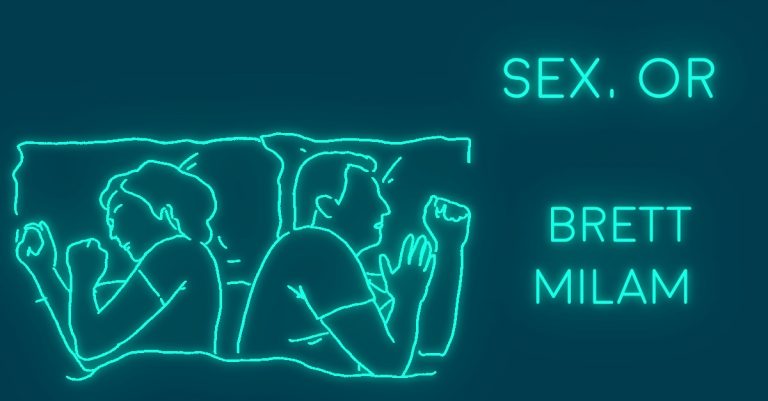
Creative Nonfiction

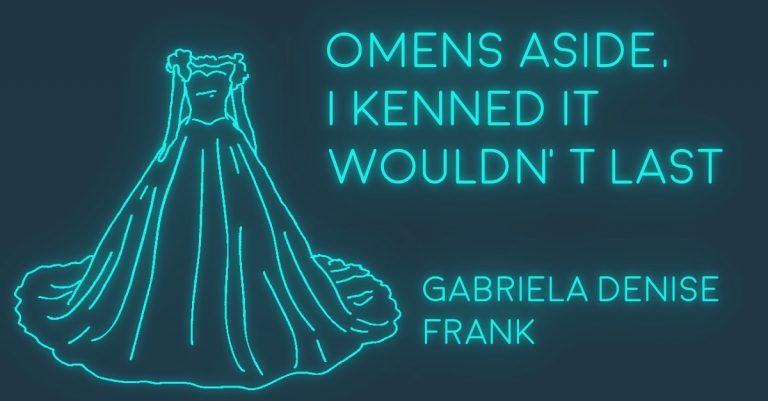
OMENS ASIDE, I KENNED IT WOULDN’T LAST by Gabriela Denise Frank

POLAROIDS by Mila Jaroniec and Cory Bennet

COUNTDOWN TO MOONLIT ROSES by Ange Yeung
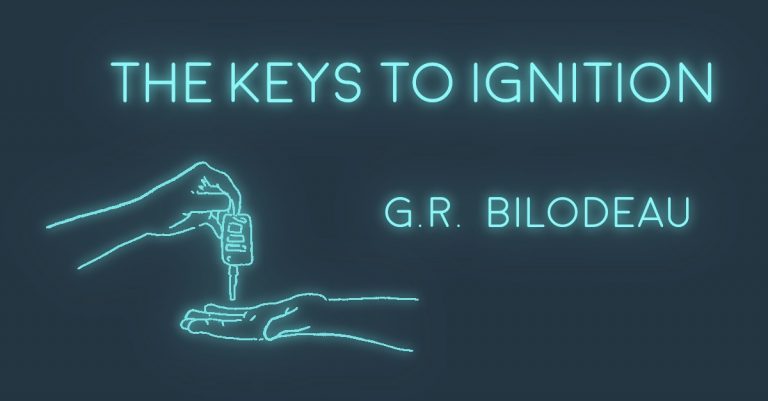
THE KEYS TO IGNITION by G. R. Bilodeau
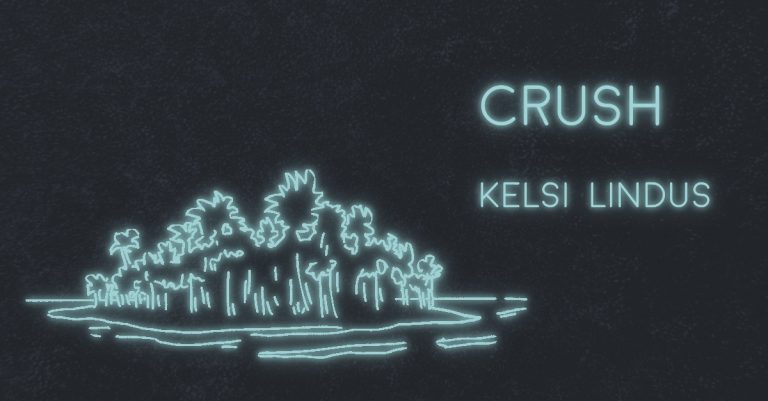
CRUSH by Kelsi Lindus
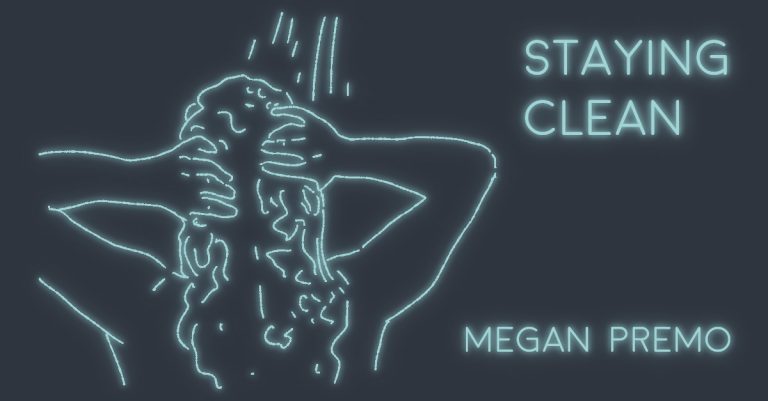
STAYING CLEAN by Megan Premo
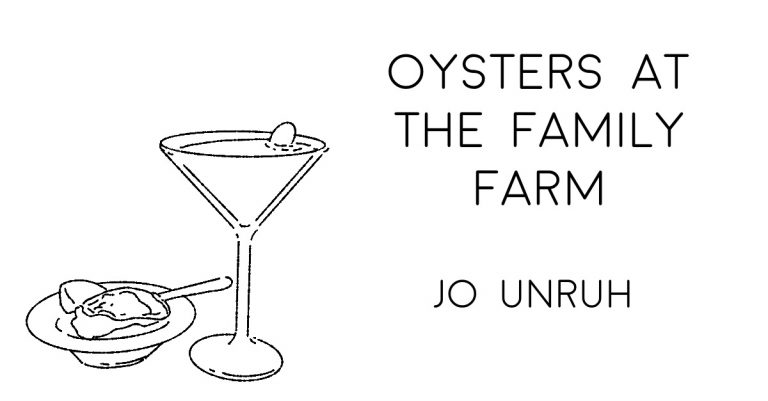
OYSTERS AT THE FAMILY FARM by Jo Unruh
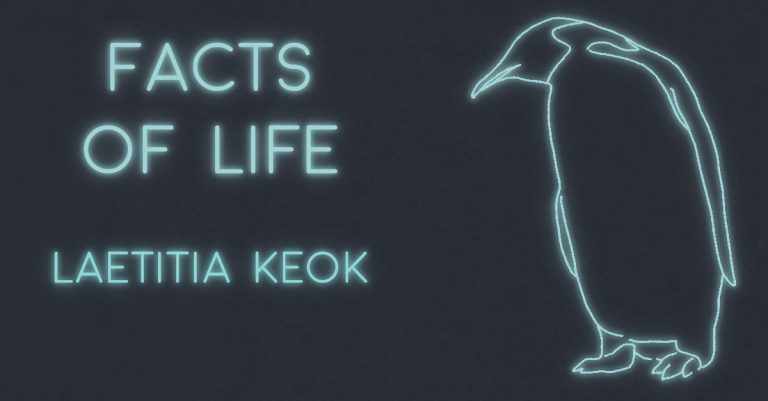
FACTS OF LIFE by Laetitia Keok
Male emperor penguins protect their eggs from the harsh Antarctic elements by balancing them on their feet.
When I tell you this, you lift me up and balance me on your feet. I am four and weigh nothing. You are a mountain of a man. With my tiny feet stacked atop your larger feet, you hold my hands and start taking wide, steady steps. We pass the balcony, and I feel the warmth of sunlight as it filters through the glass door to fall onto our bodies. Our shadows dance on the floor tiles like puppets. Then, I am flying. Past my mother’s old room that is now my aunt’s. Woosh. Past the cot that my baby sister is sleeping in. Woosh. And I am not afraid of falling—it doesn’t even cross my mind. We waddle across the living room, my cousins cheering softly in the background. Soon I am yelling directions, “停!转左!等!转右!” and we are zigzagging around the sofa and the stool and the bright red toy car that I have long outgrown, but that you’d fixed anyway. I keep my eyes on the floor—I am your guide, telling you to swerve to avoid the cracks in the floor, to turn at the right corners. When I look up, there is light everywhere—the room melts away and we are in Antarctica, inventing our own little penguin waltz. It is a long time before I am willing to walk on my own again, and I tell everyone this is how I learnt to do it: safe in your arms, fearless.
Only I am not fearless yet. I am six and it is my first day of primary school. You walk me to the gate, but I refuse to go in. I am afraid of the sickly cream-coloured walls and the pillars thicker than the width of both our bodies. But mostly I am afraid for you to leave. “Let’s walk for a bit more before I go in,” I say. “One more round, before you have to go.” You shake your head, but let me lead you to the zebra crossing and then back to the bus stop across the school compound. We circle the bush with the small white flowers once, then twice. You say “最后一次”, but we circle it another time. I cling onto your shirt sleeve. When you finally get me to step through the school gates, the walls and the pillars meld into a blur in my eyes. I am crying. I am reaching for your hand and grabbing air. I am begging for one more round, and always one more round.
Even as a child I knew to ask for more time.
There’s a line in Terese Marie Mailhot’s heart berries that says “Time seems measured by grief and anticipatory grief”.
The summer I spent chasing all 311 episodes of 《天下父母心》 with you was also the summer I realised you were not invincible. A light in the house had blown a fuse, and you were going to change it. I helped you get a ladder from the storeroom, and as I watched you climb it, I was terrified. I could not shake off an image of you falling. I imagined all the bones you could break, and all the hard edges that could break you. In my mind, I heard the dull crack of your spine, your neck, your hips. I let you get to the third rung, then made you get off. As I scaled the ladder in your place, you smiled and said, “Qi, see? Isn’t this easy? It’s good to learn now, I won’t be here forever to do it, you know.” I knew. I knew before you said it and it made me afraid.
At night, fifteen minutes into episode 201, you dozed off. As I watched the glow of the television tint your skin a ghostly purple, I traced the rise and fall of your chest and braced for the hitch in your breath, but there was none.
In so many ways, I have already grieved you.
In Parkinson's disease, certain nerve cells in the brain gradually break down or die. Early signs may be mild and go unnoticed.
At first, we do not notice the tremors. Then, they are all we see—you, earthquaking into yourself.
Here is how a body forgets itself: everything you can no longer bite into, the stiff of your feet, the hunch of your back, the tremble of your arms. You have always been quiet, but you no longer talk during meals because you’d choke if you did. You blink less. Your stride narrows.
Once, when I asked you how you’d lost half of your middle finger on your right hand, you told me you had been peeling an apple, when you’d accidentally sliced it off. I was fascinated. I thumbed the almost smooth ridge of skin that pulled itself over your remaining knuckle. “Did it make things frustrating?” I asked. “Like you suddenly couldn’t do so many things?” You ruffled my hair, chuckled, and said no, you’d just decided you didn’t need that finger.
But you will need your body, and you will not have it. It will no longer feel like yours. You will have trouble swallowing, talking, walking. You will need a wheelchair. I cannot imagine it, but you will grow unsteady. This time, there will be things you can no longer do.
There is no known cure for Parkinson’s. It is a disease that is chronic and worsens over time.
The day you are admitted, I see my mother cry for the first time in years. I learn we are all afraid—there is no such thing as fearless. She had woken me up in the morning before going to you. After she left, I sat in bed, and time swelled all around me. I had slept through it. You were in pain and I had slept through it. You were in pain and I should have felt it, somehow. Except I hadn’t. And I had slept through it all.
When I was younger, to correct my posture, my mother made me stand up straight against the kitchen wall. “Hold it for sixty seconds”, she would say. You laughed and counted the seconds with me.
Now, I count with you as you relearn your hands, finger first. One, thumb to index finger. Two, thumb to (half a) middle finger. Three, thumb to ring finger. Four, thumb to pinkie. I show you how to make a fist and unfurl it. Now, you memorise the motions to stand up safely, and I watch as it takes you multiple tries. I watch you learn to move sideways to navigate space, “like a crab”, you say. We waddle across the living room—I am your guide. I remind you to not look down, to take larger strides—“往前看,大步一点”. When I feel the ridges of the anti-slip mat in the bathroom dig into the soles of my feet, I know it must hurt for you, too, and learn you are a patient man.
Your body forgets, but mine remembers. I remember it all. Your feet, warm under mine. Your hands, always gentle. I remember that day, from years ago, when we walked eleven blocks and two traffic lights to pick my cousin up from kindergarten. I had slipped my hand into yours and thought, how I will miss you when you are gone.
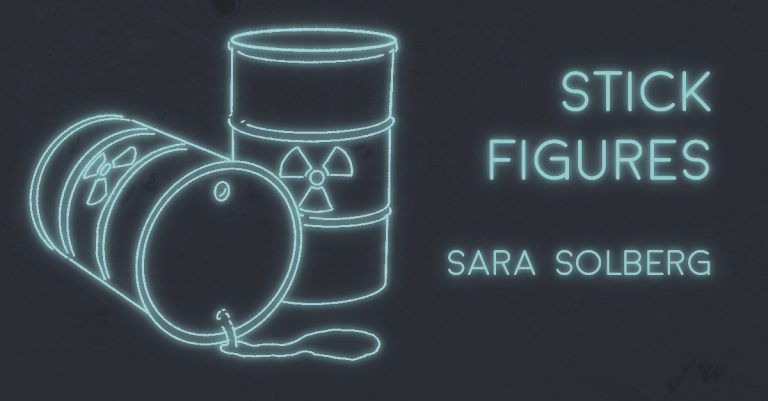
STICK FIGURES by Sara Solberg
In an eastern New Mexico desert, amid a forest of mesquite and bluestem grass, overlooking nothing but miles upon miles of iron-pressed, sunbaked earth, sits the Waste Isolation Pilot Plant (WIPP for short). On the surface, it looks like any other government base: a simple grid of unremarkable squat buildings, the tan color of which bleeds into the surrounding arid landscape. But step into one of the elevators that spend their days bobbing up and down WIPP’s vertical mine shafts, ferrying hard-hatted workers between ground level and the ancient salt bed 2,150 feet below, and it’s a different story.
One of the few deep geological repositories in the world, WIPP’s raison d'être is to store the radioactive waste produced by the US’s nuclear reactors. While the facility is only licensed for 10,000 years, the barrels of waste that get buried there will be harmful to humans much longer than that—250,000 years, to be exact. But with its rising popularity as a cleaner, more reliable, more land-efficient alternative to other forms of energy like fossil fuels and solar, both nuclear power and the often lethal byproducts that come with it seem here to stay.
Storage is one thing. What happens to that storage after we’re gone is another matter entirely.
…
A few months before my mom died, I asked her for a favor.
“I just want Dad to have something he can keep going back to,” I said, feet folded up onto the recliner in Mom’s office nook while I watched her work at her desk. I spent a lot of time like this in those days, trailing behind her around the house like I used to when I was little, desperate to soak in her presence while I still could. “You know. For different occasions and stuff.”
Outside the window her desk faced, a cardinal swooped back and forth across the bronzed orange trees lining the border of our yard.
Her bare brow furrowed beneath the rim of her fleece cap. “Write him cards?” The cancer had spread to Mom’s throat by then, and her voice was rough, her words sounding as though they’d been scoured raw with a steel dish scrubber before being set free.
I rocked back and forth, springs creaking as the chair bobbed in time with my rhythm. “Yeah. And on the envelopes you can put things like ‘open this on our anniversary,’ or ‘open this when you’re having a bad day’ or something. Like on Pinterest.”
Mom, ever allergic to technology, didn’t know what Pinterest was.
“Like a letters to your future self kind of thing. But for Dad.” Trying to prepare for the future was another thing I did a lot of in those days. But how can a person prepare for something that can only be understood in hindsight?
When I looked outside again, the cardinal was gone.
…
In 1981, the US Department of Energy commissioned a multitalented team of experts (physicists, engineers, environmental scientists, political scientists, sociologists, archeologists and behavioral psychologists, to name a few) in anticipation of the Yucca Mountain geological repository that was to be built. Though plans were ultimately scrapped in favor of the repository in New Mexico, the team—christened the Human Interference Task Force—became founding members in the emerging field of nuclear semiotics. The sole purpose of this field is to answer one thing: How do we stop generations 10,000+ years into the future from unearthing radioactive waste?
Similar to WIPP, it’s a deceptively simple question on the surface that gains immediate complexity with a little digging. Creating a warning message that will be understood by people 10,000 years out is the bare minimum goal of nuclear semioticians. Ideally, such a message would not only last a couple hundred thousand years in addition to that, but could also be deciphered instantaneously—an unmistakable Turn Back Now; Do Not Pass Go; Do Not Collect $200 that can be understood by any person in any context. But 10,000 years is already double the length of recorded human history. 250,000 years is almost as long as Homo sapiens have existed.
To come up with a clear message that will not only survive in meaning, but in material form—something that will resist the decay of time, that won’t wither like a plant carcass in the searing New Mexican heat, eroded by nature or chipped away by human hands—is almost incogitable.
…
I stopped by Target to find some cards that looked worthy of being the message bearers to my future, widowed dad from his future, deceased wife. The fluorescent lights reflected off the white shelves and white tiles and white ceiling, and it felt like I was the dead one, ascended to a heaven that resembled the gift section of a department store. The Hallmark dogs with their halos and wings only solidified the mirage.
I stood in front of the blank, boxed cards for several minutes, trying to choose from an assortment simultaneously too meager and too diverse. What, I wondered, was the appropriate design for a situation like mine? Colorful circles, bumping up against one another in random patterns like marbles tossed across a floor? Shadows of birds balanced on a wire, twittering quarter and eighth notes that trailed in a wispy string above their heads? The tidy, monochromatic lineup of trees, each a different shade of blue? What design most strongly said, I’m sorry I died? What most said, I was thinking of you then, even if I can’t be there with you now?
I ended up buying two boxes of flower prints: the first a diverse bouquet, the second a wreath of roses and daisies, in the center of which perched a green and yellow, vaguely bohemian sparrow. Its one visible eye, just a small black dot on its turned away face, stared into the distance, perhaps contemplating the wrapping paper a few feet away, or maybe its own two-dimensional existence, frozen on paper until it was either destroyed or disintegrated with age.
Mom loved flowers—loved the wild bouquets I’d sometimes pick for her, loved getting dirt under her fingernails pulling weeds from the garden. Mom loved birds, going as far as to get a few birdwatching guide books so she’d be able to identify the species that tended to hover around the backyard feeders. She loved life.
The cards weren’t enough. They were never going to be enough. But they were better than nothing at all.
…
Numerous solutions to the nuclear semiotics riddle have been proposed since the 1980s, each with their own unique shortcomings. Perhaps the most commonly suggested warning is a simple written message—Rosetta Stones whose multilingual inscriptions can be updated every handful of decades for indefinite millennia. Languages, though, are as alive as the people who use them, ever-changing as they age. It’s only taken six centuries for the English used in Chaucer’s The Canterbury Tales to become unreadable to modern English speakers. Given the infinite unknowns that await humanity, it’s an act of pure faith to believe a message written today will still be translatable 10,000 years out.
Some have suggested using pictograms; Carl Sagan famously insisted the most effective message would be a simple skull and crossbones. But symbols, like language, are ever-evolving. Before it became an omen of death during the Golden Age of Piracy, the skull and crossbones was used by the Knights Templar as a symbol of the Christian rebirth. Today, it’s inseparable from children’s Halloween costumes and Disney movies featuring Johnny Depp.
The next logical step after individual pictograms is a series of them. A narrative. A comic strip depicting a person dying after they’re exposed to the radioactive waste buried below. Stories and stick figures, after all, are two of the few universals that have existed as long as humans have been around. But even then, there’s no guarantee future humans will interpret a comic strip in left to right sequence. Read right to left, it becomes a resurrection story.
Other solutions have included everything from folktales to atomic priesthoods to bioluminescent cats that will glow when they’re within a certain distance of a repository.
And others still have said it’s all a lost cause. Humans have always had a compulsion to excavate. To know. To remember our forgotten histories. Surely, any warning message we leave is just as likely to be seen as an invitation. Why waste our own finite time on earth trying to protect some distant perhaps?
…
Mom bought a small, hinged box from Hobby Lobby to put the cards in—one that resembled a pirate’s treasure chest, complete with an arched top and fake iron plating. It sat in my room for weeks after her funeral, wrapped in a plastic grocery bag to shield it from dust, shoved to the far corner beneath my bed.
As I promised her I’d do, I gave it to my dad once things settled down and the reality of our new lives had started to take shape. There was nothing I could think to say in response to his tears or shaking hands when he reached out to take it—no comforting Hallmark platitudes, no way to boil down the immensity of our loss into something comprehensible.
That’s the paradox of such situations: finding a way to communicate the incommunicable.
I left my parent’s bedroom in silence, quietly closing the door behind me.
…
Many people mistakenly assume WIPP is located where it is because it’s remote. As survivors of disasters like Fukushima can attest, after all, living in the vicinity of radioactive material isn’t an enviable position. In actuality though, the facility owes its placement to one thing, and one thing only: the 2,000 feet of continuous salt below.
The remnant of a sea that evaporated 250 million years ago, the salt bed is an ideal burial ground for nuclear waste for multiple reasons. It’s accessible. It’s malleable, and therefore easy to mine. It’s geologically stable, and impermeable by water.
But above all else, salt is capable of healing. Eventually, 75 years or so after WIPP’s mine is filled to capacity and closed off, left to sit for time immemorial—either remembered or forgotten, as all things are—the salt will collapse around the barrels of waste. It will collapse, and then it will begin to stitch itself together, fractures and fissures filling over the course of a few decades until the barrels have been wholly encapsulated, the surface sealed once more.
I wonder what scars will remain.
